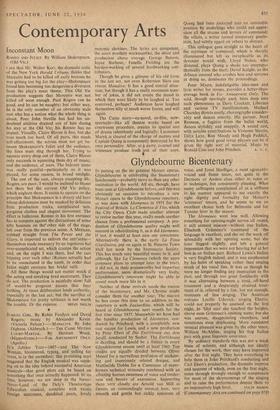Glyndebourn e Bicentenary
IN putting on the six greatest Mozart operas, Glyndebourne is celebrating the bicentenary handsomely—probably more so than any other institution in the world. All six, though, have been seen at Glyndebourne before, and this was obviously an occasion to introduce a new Mozart opera to the Glyndebourne repertory, as was done with ldomeneo in 1951 for the Festival of Britain. La Clemenza di Tito, which the City Opera Club made another attempt to revive earlier this year, really needs another chance from a professional company. A pro- duction of Glyndebourne quality might well succeed in rehabilitating it, as it did ldomeneo. If not, it would at least case our conscience. Alternatively there is the early La Finta Giardiniera, put on again at St. Pancras Town Hall last week by the Impresario Society. This has much very beautiful music in it. and although, like La Clemenza (which the same company plans to attempt later in the year), it did not, in their praiseworthy but imperfect performance. seem dramatically very lively, Glyndebourne's resources might be able to reveal much more life in it.
Neither of these revivals needs the excuse of the bicentenary, and Mr. Christie might consider them for another year. The nearest he has come this time to an addition to the repertory is with Zauberflote, which will he heard at Glyndebourne next month for the first time since 1937. Meanwhile we have had the familiar production of Idomeneo, con- ducted by Pritchard, with a completely new cast except for Lewis, and a new production by Peter Ebert of Die Entfiihrung arcs dem Serdil, conducted by Sacher. The Entfiihrung is dazzling, and should be a fixture in every Glyndebourne season until at least 1960. Top credits are equally divided between Oliver Messel for a marvellous profusion of enchant- ing and ingeniously related designs, and Mattiwilda Dobbs for a Constanze of super- human, technical virtuosity combined with an affecting human sweetness of voice and tender- ness and beauty of expression. Supporting them very closely are Arnold van Mill as Osmin. an outstandingly musical bass, very smooth and gentle but richly sonorous of
voice, and Ernst Haetliger, a most agreeable- voiced and fluent tenor, not quite in the Dermota or Anders class either in voice or in technique, but consistently pleasing. What many colleagues complained of as a stiffness in his manner appeared to me exactly the right dignity and formality for Mozart's 'aristocrat' tenors, and he seems to me an excellent choice both for Belmonte and for Tamino later in the season.
The ldomeneo went less well. Allowing something for opening-night nerves all round, it still seemed miscast—without one Italian. Elisabeth Grammer's command of the language is excellent, and she set the work off splendidly with her opening scene, but she later flagged slightly, and left a general impression that we were not hearing her at her best in an Italian part. Richard Lewis's Italian is very English indeed, and it was emphasised by his habit of speaking rather than singing much of his vocal line. It was as though he were no longer finding any inspiration in the part, and through too great familiarity with it was alternating between a tired, off-hand treatment and a desperately strained treat- ment of it, relieved by a few, but not enough, moments of line singing. The Ametican soprano Lucille Utlovick, singing Electra, could not properly be assessed on the first night. In 'Idol mio' she touched the heights, above even Grammer's opening scene, but she was uneven, disappointing elsewhere, and sometimes even displeasing. More consistent musical pleasure was given by the other tenor, William McAlpine, singing his first Italian part with great linguistic assurance.
By ordinary standards this was not a weak team of soloists, and although not ideally chosen for the work, they may have improved after the first night. They have everything to help them in John Pritchard's conducting and Carl Ebert's production, the dramatic impetus and tautness of which, even on the first night, came through strongly enough to compensate for most of the shortcomings of the singing and to raise the performance despite them to
an impressively high level. COLIN MASON (Contemporary Arts are continued on page 858)


































 Previous page
Previous page